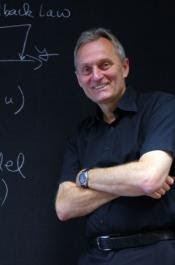Speaker
Description
As the demand for energy grows, energy systems are becoming increasingly complex. Current systems heavily rely on fossil fuels, leading to negative environmental impacts. To mitigate this, future systems are expected to feature a significant proportion of renewable sources, though these are often uncertain and intermittent. One solution to better allocate renewable resources involves enabling a stronger operational coupling among the principal energy carriers: electric, heat, and gas grids. This introduces major challenges from a control perspective, as the complexity and scale of integrated energy systems grow substantially.
In this context, port-Hamiltonian systems theory provides a systematic and intrinsically modular framework for the modeling and control of complex multi-energy systems. Although port-Hamiltonian formulations for thermodynamically reversible processes are well established, systematically and modularly representing systems with both reversibilities and irreversibilities remains an active research area.
This work addresses the challenging problem of modularly modeling complex electro-thermal microgrids featuring converter-interfaced electrical sources, heat exchangers, and heat pumps. The latter components enable strong coupling between electric and heat grids but introduce very complex thermodynamic phenomena, such as phase-changing flows and other irreversibilities.

